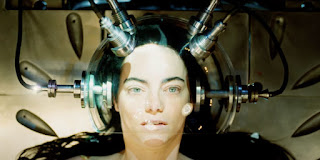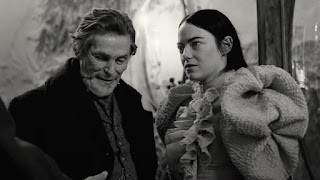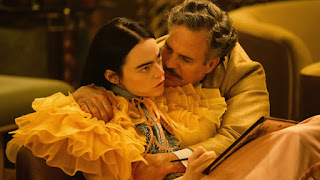Ending the year on a high note: Yorgos Lanthimos' Poor Things
"I am Bella Baxter. I am a flawed, experimenting person. I seek outings and adventures. Bella's so much to discover. And there is a world to enjoy, circumnavigate. It is the goal of all to progress, grow."
Following The Favourite might have been a tough act to follow, but he's done it with aplomb and I really don't want to spoil anything about the film but I also want to stay up and talk about it all night long. Yeah, it's one of those.
It's rare that a film so bursting with ideas, observation and depth comes along and is, as it happens, ridiculously darkly funny. The comparisons with Gilliam are apt, but Lanthimos is more profound and demanding than Gilliam.
Briefly, Emma Stone plays Bella Baxter, whose brain is actually that of the child who was being expected by a woman who committed suicide. Let that sentence resonate for a bit. The woman's body was brought to Godwin Baxter ("God" for short, both a little too on point, but also, well, accurate, and also well, kinda funny) whose house and garden is replete with strolling chimerae and whose experiments are right out of Mad Scientist 101. However, as portrayed by Willem Dafoe, God is a remarkable conundrum; a brilliant scientist with no small degree of gentility, an occasional prick, and withal another fascinating addition to the Dafoe collection of remarkable performances.
Baxter didn't feel it was up to him to save the woman because how could he judge the misery that brought her to end her life and had he saved her, she would have been sent to the madhouse, this being Victorian England.
Before we get too far afield, it is barely Victorian England. There are elevated prams soaring over the city (cities, we also see similar conveyances in Lisbon and Athens); the tech isn't completely steampunk, but/and the buildings are almost Gaudiesque, if not Boschian in some cases. Conversation is "proper" until it's not, things "just aren't done" until they are, and the catalyst for the improper and things not to be done is Bella.
Bella's baby brain develops rapidly in her mother's body. When we first meet her, she's a toddler whose verbal range is syllabic. By the time we're done, she is an original thinker. At the outset, Max McCandles - one of Baxter's students hired as his assistant - says upon first seeing Bella, "my, what a pretty retard." By the movie's end, they are wed. But the adventures getting there are epic and wondrous. As Bella says:
"I adventured it and found nothing but sugar and violence."
Of course, we're in the land of fable. Bella is not just "a pretty retard" and the Victorian Era is not the historical era with which we're familiar. It doesn't take too long to figure out that a woman like Bella exercising her agency and freely expressing herself as she does throughout the film would have been carted off to the loony bin almost immediately upon her first public utterance.
No, Lanthimos, screenwriter Tony McNamara, and lead actor and producer Emma Stone have other ideas. (I'm also assuming that their genesis may lie in the novel by Alasdair Gray.)
Bella is told to say only three things, castigated for whoring, repeatedly imprisoned or told she cannot leave a place, ridiculed for pursuing philosophy, and threatened with genital mutilation to cure her of - you know, being herself. Sure, Victorian England is a legitimate backdrop and context for these attitudes, but it's thuddingly obvious that Bella is any woman alive now (or just about any time, really, come to think of it).
"I will see you after the grand adventure." Bella to Max
By the end of the first act, she is betrothed to Max, but the terms of the marriage as set by Godwin are that they must always live with him and not travel out into the world. Upon being wooed by Godwin's attorney, Duncan Wedderbum (Mark Ruffalo acting as we've never seen him act before, more on this later) - who even Bella recognizes as untrustworthy and a cad - she tells Godwin and Max that she is leaving with Duncan to live and have adventures, but that she'll be back to wed Max.
Godwin is supportive of Bella. He recognizes her agency and, I believe, when she told him that if he didn't let her go she would "turn rotten with hate", this stung him more deeply than he would ever admit. Godwin keeps falling back on the stoic-minded scientist who will not let emotion dictate his actions. Indeed, later in the film, he has become so estranged from his emotions that he doesn't recognize the torture and abuse his father visited upon him as anything but evidence of an inquiring, disciplined scientific mind. The scars he carries on his face likely pale next to those he internalized.
In any case, Bella and Duncan run off and the movie launches into high gear. Color ushers in where Robbie Ryan's cinematography had been glorious black and white, and we find ourselves in one of the most eye-popping films of 2023.
There's a rhythmic use of fish-eye lenses and short jump/zoom shots that are seemingly random but serve to underscore how Bella encounters everything fresh. Everything is new to her and she questions everything. Spitting out distasteful food she asks quite rationally, "why keep it in my mouth if it is revolting?" Bella does that a lot. She asks straightforward questions and speaks directly what is on her mind. Unlike some people who do so, she tends to add nuance to what she says for clarity and expects to receive straight answers.
There lies the rub; almost no one gives her straight answers until forced to do so. In Duncan's case and more or less to his credit, he admits that he's a womanizer and not a man to be trusted. Like everyone else in the film (and in life?), his feelings matter more than anyone else's and certainly more than Bella's whom eventually professes to love and is taken aback when it's clear she doesn't feel the same way. It also doesn't help that she gives away all his earnings from gambling to aid the poor in Alexandria when the ship they're on comes to dock.
Let's talk about that ship for a second. Duncan absconded with Bella to Lisbon where they apparently did little else than eat and fuck all day. Things shift when she adventures (to use her verbification) to explore around and discovers some of the sugar and violence referred to in the opening quote to this post. The scene shifts to a cruise when Duncan feels she's bored with Portugal. Upon being released from a steamer trunk on board, Bella quickly surmises that she's imprisoned yet again.
Yet, it's on the boat that she will have an unexpected journey of the mind when she meets Martha (Hannah Schygulla, too long I haven't seen her; what a joy) who introduces her to the works of Emerson and we assume, others. She and Bella speak candidly about sex and pleasure and expanding one's horizons. Martha is accompanied - platonically, I hasten to add - by Harry Astley, Jerrod Carmichael - whose standup I've seen, but none of his film work or - and I am remiss - his role on Ramy, Ramy Youssef's autobiographical show. Oh, and it's Youssef who plays Max.
Back to Harry, though. He is a cynic of the highest order and disparages philosophy and finds the idea of humans improving themselves delusional. It is Harry who takes Bella to the slums of a Boschian Alexandria and in turn, unwittingly, inspires her to help others. In a particularly affecting scene, Harry confesses to Bella that he showed her the horror of the poverty and degradation of the slums to hurt her, that he felt he had to shock her out of her optimism. It's a tender moment and we see how Bella defines herself as opposed to being defined by others. When Bella tells him that "I always think it will be better", his reply - "of course you do" - isn't snarky or sarcastic. He gets it and sees her sincerity.
Sadly, Bella's newfound societal conscience comes at a cost for Duncan. She gathers up his earnings from gambling, stows them in a box and hands them to a sailor to be disbursed to the poor in the slums. We will sidestep her naivete here, as I believe Lanthimos intends for us, and focus on her motivation. That motivation gets them tossed off the ship in Marseille and they make their way to Paris where Bella believes that the best way for her to make money is to work in a brothel. As she tells Swiney, she needs sex and she needs money and the terms seem fair. Of course, when she tells Duncan this, he falls apart, calls her a whore and frankly, embarrasses himself.
At the brothel, Bella befriends Toinette, a socialist and Bella tries to introduce a more egalitarian approach to customer relations. Swiney quickly surmises where Bella got the idea and sics a particularly distasteful customer on Toinette who will service him free of charge. Bella, she takes into a private antehamber and explains to her that there are some men who prefer knowing that the woman doesn't like it. She points to her grandchild and further explains that she runs the business to ensure the child has food and a place to live.
She adds a philosophic note, as well, one that has proved to be Bella's raison d'etre throughout the film. "We must experience everything, not just the good but degradation. Horror. Sadness. Then we cna know the world. And when we know the world, the world is our. This makes us whole." Kathryn Hunter delivers a masterclass in what a supporting role can be. Her Swiney is a fully realized person with a past and a worldview.
I short order, we also learn that Godwin is dying. Max locates Duncan and gets out of him Bella's whereabouts and when she arrives back at Baxter's, learns the tale of how she came to be. She is taken aback by both Godwin's and Max's silence and upon seeing Felicity, the new experiment, declares them monsters and leaves.
After clearing her head - and mind you, there are no huge histrionics on Bella's part by this point; she's in control of the situation and still speaks honestly and truthfully - she returns and while not letting either man off the hook, is happy to be back. She also proposes to Max; despite her history, he obviously accepts Bella fully. "I find myself merely jealous of the men's time with you, rather than any moral aspersions against you. It is your body Bella Baxter. Yours to give freely." Yeah, this wouldn't have flown in Victorian times and I'm not even sure it's something most men would say now.
The wedding is interrupted when Duncan shows up to object with Alfie Blessington in tow. Blessington was married to Bella's mother, Lady Blessington, and we assume that she leaves Max at the altar out of curiosity as much as to find a solution to the current situation and perhaps to learn more of her-but-not-her fate.
Oh, dear. Lady Blessington was married to a right asshole. Self-righteous, demoniacal, tryannical, misogynistic, and altogether unpleasant, she makes known that she has no intention of staying with him and calls his bluff when he threatens to shoot her if she doesn't take the ether laced martini so she can undergo the aforementioned genital mutilation. Suffice it to say that doesn't happen, but also, I realize I've written far more than I wanted to.
You can probably guess that she leaves Blessington successfully, particularly after he shot himself in his foot (she brings him to Max to sew up and save). We leave everyone - Bella, Max, Felicity, Toinette, and Mrs. Prim (Baxter's housekeeper) seemingly content as Bella is gearing up for her medical studies to become a surgeon and Blessington - or his body with a goat's brain - is happily chomping away on leaves.
There are not words for how extraordinary what Stone and Ruffalo, in particular, accomplished here. Stone I expect to be great every time I see her. Ruffalo, too, but this time around he is simply outstanding in a way far different from his turns in, say, Zodiac or Foxcatcher. What he does here is outright comedy, but with pathos that does make me think of some of the great comic actors of the past.
Everyone's work is outstanding and Suzy Bemba as Toinette is a quiet revelation.
Poor Things is the kind of film from a director whose work continues to inspire and surprise me. Maybe not since Scorsese have I encountered someone whose works are so different in theme and structure from each other and where the sheer craftsmanship of all hands comes together to so consistently produce a unique vision.
There is a kind of Wes Andersnonish whimsy throughout the film and it's not just in the sets; watching the great young fado singer Curlinha sing on a balcony stops us (and Bella) in our tracks, the sugar in the Portugal sequence. It's also in the dialog, particularly between Ruffalo and Youssef in the scene in the facility Max goes to confront Duncan. It's a remarkable back and forth.
As much as everyone is so in synch and all the pieces fit, Poor Things astonishes as the insightful nature of the script burrows deeper into the heart after the film is over. As much as this is very much about one woman's freedom, it is about all women and reflexively, about men who may not even be aware of what they're doing when they expect women to behave this way or that way; when this is acceptable, but that is not.
I feel like I could go on and on. I will be going back to the film shortly (it has to be seen on the big screen; it truly doesn't look like any film in recent memory). Jerskin Fendrix's score is remarkable, as well; he's a story all to himself, wrapped in mystery and whose album Wintereisse is definitely worth seeking out. But it's telling that this is the first time Lanthimos has employed a composer for a soundtrack. A splendid choice.
A Gallery of Stills from Poor Things:
(Remember to double click on the image to launch a slideshow and/or see the image enlarged.)











Comments
Post a Comment